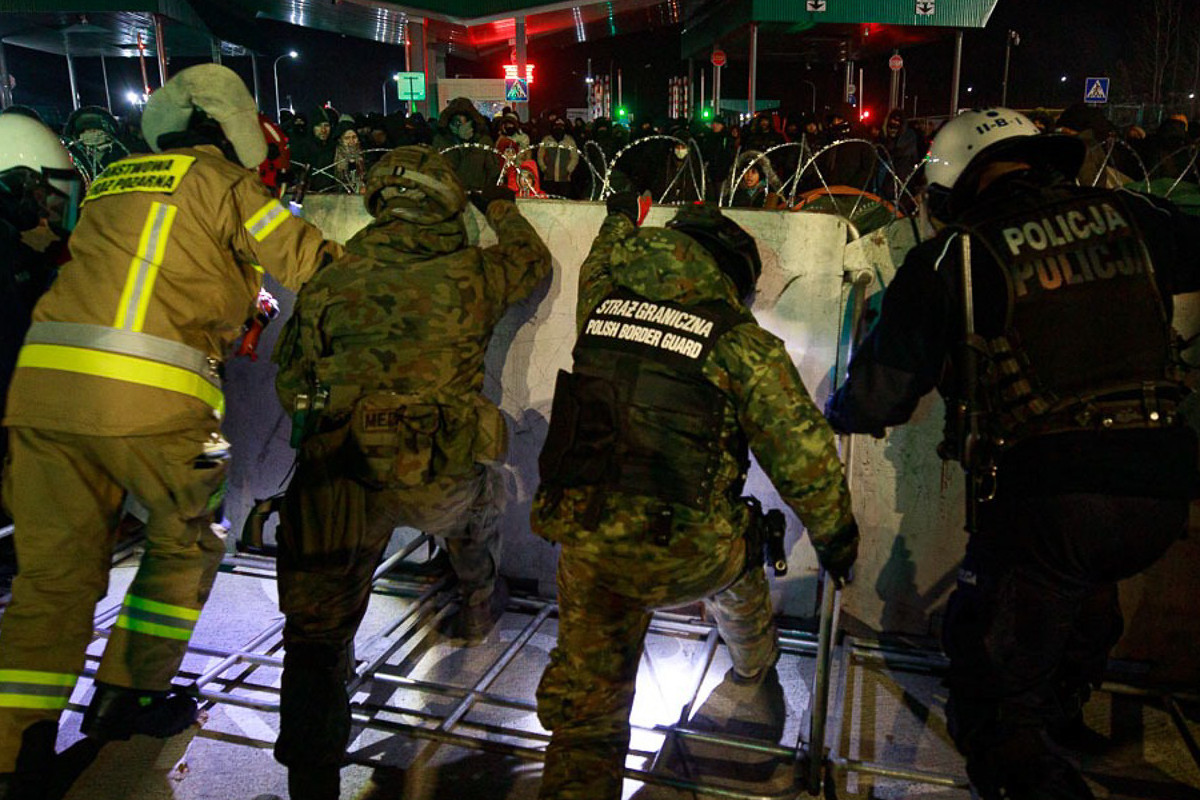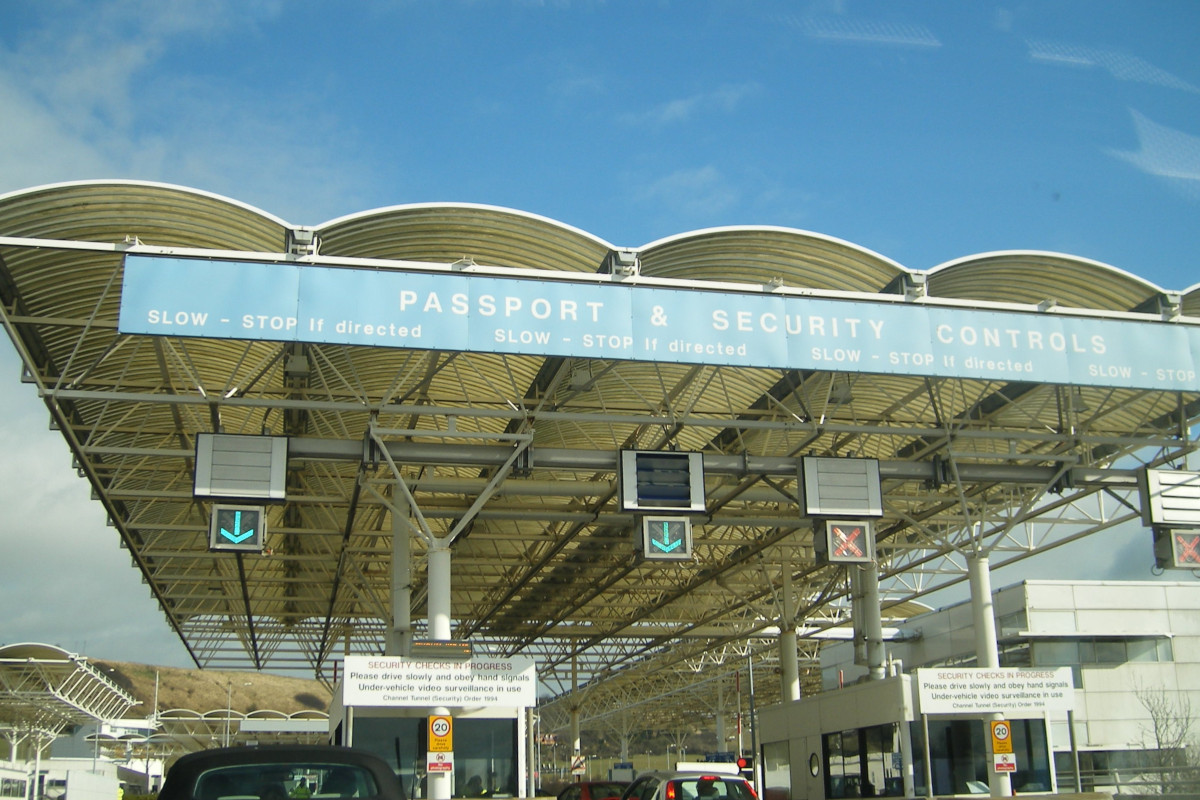Council seeks to water down human rights safeguards in migration “instrumentalisation” rules
Topic
Country/Region
17 November 2022
References to child’s best interest and non-refoulement removed; derogations could be applied to people “disembarked following search and rescue operations”.
Support our work: become a Friend of Statewatch from as little as £1/€1 per month.

Image: Kancelaria Premiera, CC BY-NC-ND 2.0
On 4 November 2022, the Czech Presidency of the Council of the EU circulated a proposed compromise text of the Regulation addressing situations of instrumentalisation of migration and asylum (pdf). It was discussed by the JHA Counsellors working party on 9 November. The proposal was put forward in response to the situation at the Belarusian-Polish border in 2021.
The Czech Presidency hopes to see the Council adopt a position on the text by the end of December. Human rights groups have said that the proposal, which allows wide-ranging derogations from EU asylum law, could "undermine respect for EU law as a whole" and should be withdrawn:
"An agreement on the proposed Instrumentalisation Regulation has the opposite effect and dismantles asylum in Europe, by allowing Member States to opt in and out of the CEAS [Common European Asylum System]."
Compromise text
Migration has been deleted from the title in the new compromise text, leaving references only to asylum and return. References to the best interests of the child in the draft Regulation have been removed, apart from in the preamble 4, and the same applies to the non-refoulement principle (removed from Article 4 but maintained in paragraph 13 of the preamble).
The compromise text places “non-state actors” alongside third countries as parties potentially responsible for instrumentalising migration by “instigating irregular migratory flows” with the intention to “destabilise the Union or a Member State”. Instrumentalisation applies if an action is liable to “put at risk essential State functions, including its territorial integrity, the maintenance of law and order or the safeguard of its national security”. “Stateless persons” are added to third-country nationals as actors who may be instrumentalised in this way.
A new paragraph in the preamble, 1a, specifies limits to the possibility of non-state actors being accused of instrumentalisation:
“(1a) Situations in which non state actors are involved in organised crime, in particular smuggling, should not be considered as instrumentalisation of migrants when there is no aim to destabilise the Union or a Member State. Furthermore, humanitarian aid operations should not be considered as instrumentalisation of migrants when there is no aim to destabilise the Union or a Member State.”
It remains to be seen whether this will survive the negotiations.
Further changes
Article 1 of the proposed Regulation explains that it established a framework allowing the exceptional derogation of rules from the Asylum Procedure Regulation, the Reception Conditions directive recast and the Returns Directive recast, if necessary to respond to a situation of instrumentalisation.
Chapter II of the compromise text sets out an “emergency asylum and return procedure” to respond to such situations, allowing derogations by MSs in cases involving people apprehended in the context of “unauthorised crossing by land, sea or air, or who are disembarked following search and rescue operations.” or who show up at border points “as a result of instrumentalisation”.
The addition of people disembarked following rescue at sea and “non-state actors” are indicative of an expansion of this concept. However, while France, Germany and Poland are reportedly strongly in favour of including the possibility for the Regulation to apply to people “disembarked following search and rescue operations,” Italy is strongly against this idea.
A derogation from the Asylum Procedure Regulation’s art. 27 allows the registration of asylum applications within three weeks (previously four weeks), prioritising the registration of people with special protection needs or well-founded cases. Further derogations would make it possible to issue admissibility decisions in locations at the external border and/or in proximity of borders or transit zones. People with special protection needs and relatives of minors should be prioritised, and member states may also prioritise international protection applications that “are likely to be well-founded or manifestly unfounded”.
The maximum duration of the emergency asylum procedure is set at twenty weeks (up from sixteen in the previous draft), and the personal interview may be omitted in cases in which the “determining authority is able to take a positive decision on the basis of the evidence available with regard to the subsidiary protection status.”
On material reception conditions member states may set alternative modalities for reception, but these must “cover the applicants’ basic needs, in particular food, water, clothing, adequate medical care, and temporary shelter adapted to the seasonal weather conditions, and in full respect of human dignity”.
An emergency return procedure (Article 4) is established regarding instrumentalisation cases for people whose asylum applications were rejected and have no right to remain. References from the previous draft to respect for the non-refoulement principle, the limitation of coercive measures and detention, and emergency health care and the needs of vulnerable subjects have been removed; these have been replaced with a reference to provisions of the recast Return Directive that include relevant safeguards.
Chapter III sets out procedural rules for the “authorisation procedure” and “cooperation and assessment”. In the first case, member states may request the use of derogations in response to cases of instrumentalisation, to be evaluated by the Commission. The addition of art. 7(2a) to the text indicates MSs’ intention to make this process swift and semi-automatic:
“2a. Without prejudice to paragraph 2, where the requesting Member State submits to the Commission conclusive evidence demonstrating the existence of the conditions referred to in Article 1(2), the Commission shall, on the basis of that evidence, without delay, make a proposal for an appropriate Council Implementing Decision referred to in paragraph 3.”
The proposed Council Implementing Decision shall be examined “as a matter of urgency” and, if approved, it will set a starting date and the duration (no longer than six months) of applicable derogations. Both the Council and the Commission will continuously monitor and review instrumentalisation cases, and the possibility of a six-month extension for the derogations is provided. Requests may also be made by the concerned MS on the basis of available information for the derogations to be repealed, but ongoing individual procedures “shall continue to be dealt with in accordance with the derogations”.
Secondary migration and violence at borders
Preventing secondary migration remains a priority in instrumentalisation cases, as a further addition to the preamble makes clear:
“(14a) In a situation of instrumentalisation, it is of particular importance that all measures are taken to prevent secondary migration while at the same time providing full support to one or more Member State faced with the arrival of third-country nationals or stateless persons as a consequence of such situation. Furthermore this Regulation does not affect the exercise of the responsibilities incumbent upon Member States with regard to the maintenance of law and order and the safeguarding of internal security.”
Another significant amendment to paragraph 10 of the preamble concerns violence at borders and mass attempts to enter violently, which are likely references to events at Polish, Greek and Spanish borders (particularly in Melilla on 24 June 2022) in the last two years. While the text states that “violent acts at the border must be avoided at all costs,” a new sentence in the compromise text suggests that member states may use their discretion in response:
“Member State concerned may, in particular in a situation of instrumentalisation of migrants, where third-country nationals or stateless persons attempt to force entry en masse by using dispropotionate violent means, take the necessary measures to preserve security, law and order and ensure the effective application of this Regulation.”
Documentation
- Proposal for a REGULATION OF THE EUROPEAN PARLIAMENT AND
OF THE COUNCIL addressing situations of instrumentalisation in the field
of migration and asylum - Presidency compromise text (Council doc. 13963/22, LIMITE, 4 November 2022, pdf)
Further reading
- 12 October 2022: EU: Czech Council Presidency wants "substantial" increase in deportations
- 1 February 2022: Building walls, restricting rights: Lithuania's response to the EU-Belarus border 'crisis'
- 16 December 2021: EU: Asylum and borders proposals: the only attack taking place is the attack on peoples’ rights
Our work is only possible with your support.
Become a Friend of Statewatch from as little as £1/€1 per month.
Spotted an error? If you've spotted a problem with this page, just click once to let us know.

